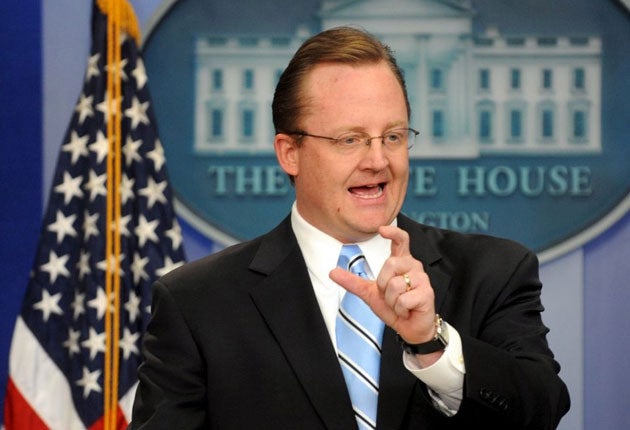Defiant North Korea quits nuclear talks
Pyongyang stance gives Barack Obama his biggest foreign policy headache yet

Your support helps us to tell the story
From reproductive rights to climate change to Big Tech, The Independent is on the ground when the story is developing. Whether it's investigating the financials of Elon Musk's pro-Trump PAC or producing our latest documentary, 'The A Word', which shines a light on the American women fighting for reproductive rights, we know how important it is to parse out the facts from the messaging.
At such a critical moment in US history, we need reporters on the ground. Your donation allows us to keep sending journalists to speak to both sides of the story.
The Independent is trusted by Americans across the entire political spectrum. And unlike many other quality news outlets, we choose not to lock Americans out of our reporting and analysis with paywalls. We believe quality journalism should be available to everyone, paid for by those who can afford it.
Your support makes all the difference.An angry North Korea yesterday evicted all international nuclear inspectors, hours after saying it would withdraw from six-nation disarmament negotiations and reactivate its nuclear processing facilities in response to a UN Security Council statement condemning its long-range missile launch.
North Korea added that it intends resuming the manufacture of bomb-grade plutonium from spent rods at its Yongbyon nuclear installation.
The eviction of the inspectors was confirmed by the International Atomic Energy Agency in Vienna. The government "has today informed IAEA inspectors in the Yongbyon facility that it is immediately ceasing all co-operation with the IAEA," a spokesman, Marc Vidricaire, said. "It has requested the removal of all containment and surveillance equipment, following which, IAEA inspectors will no longer be provided access to the facility."
All four of the UN inspectors now in the country are expected to have left by tomorrow. Before departing, however, they have been told to remove seals that had been placed on parts of the Yongbyon complex.
"We have no choice but to further strengthen our nuclear deterrent to cope with additional military threats by hostile forces," the Pyongyang regime said in a statement issued even before the notice to leave was sent to the UN inspectors. It added that there would be "no need to hold six-party talks" because other members have turned them into "a platform for infringing upon the sovereignty" of North Korea.
It may be that North Korea is feeling particularly stung by the decisions of Russia and China to join other members of the Security Council in Monday's unanimous condemnation of the launch, even though both countries had resisted attempts by the US to take the process further with a fully fledged sanctions resolution.
International inspections of North Korea's nuclear facilities had resumed only last October.
The decision to pull out of the six-party talks, which bring together North and South Korea, China, Japan, the US and Russia, provoked expressions of dismay from several governments. Sergey Lavrov, Russia's Foreign Minister, warned against seeking an alternative approach. "The negotiators of this forum have reached important agreements that impose obligations on all the parties, not only North Korea," he said.
The reaction from the White House was also firm. "We call on North Korea to cease its provocative threats and to respect the will of the international community and to honour its international commitments and obligations," the White House spokesman Robert Gibbs said. "North Korea's threat to withdraw from the six-party talks and restart its nuclear programme is a serious step in the wrong direction."
Foreign policy experts note that North Korea is practised at raising the temperature with the West above all as a negotiating tactic. "Extracting concessions from the United States and others has been very much a part of North Korea's approach to negotiations over its nuclear programme," said Even Feigenbaum of the Council on Foreign Relations in New York. "The question that several US administrations have asked is whether there are any incentives that will help to produce a change in North Korea's behaviour."
Last night the Foreign Office described North Korea's decision to cease co-operation with the United Nations nuclear watchdog as "completely unjustified" and insisted that the Security Council statement was a "proportionate" reaction to the rocket launch, which was in breach of a UN resolution.
The six-party talks have long been a stop-go affair. Progress had seemed promising in 2007 when North Korea agreed to begin disabling facilities at the Yongbyon facility in exchange for development aid and deliveries of fuel oil from the West. But even before this latest stand-off, the talks had become bogged down over the lack of transparency offered by North Korea in accounting for its past nuclear activities.
The North continues to insist that the launch on 5 April was for the placing of a communications satellite in orbit and was therefore peaceful.
US observers have claimed that the satellite actually crashed into the Pacific, while the Pentagon believes its real intent was to test the rocket for military purposes. The US fears that North Korea might one day be able to fire warheads as far as Alaska and Hawaii.
Join our commenting forum
Join thought-provoking conversations, follow other Independent readers and see their replies
Comments